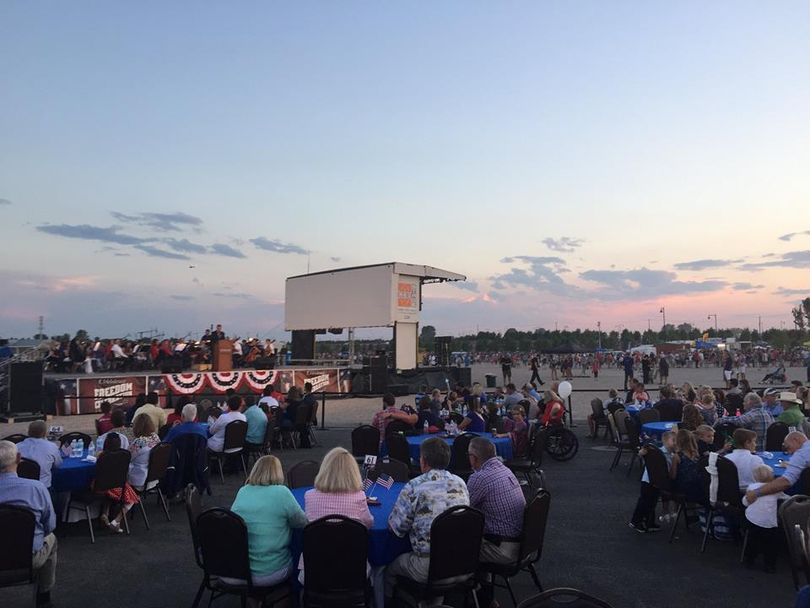2018 gubernatorial candidates already out on the stump together…

Here's my full column from Sunday's Spokesman-Review:
By Betsy Z. Russell
All three major GOP candidates for governor were sitting at the same table on the Fourth of July, at the big Idaho Falls fireworks extravaganza hosted by Melaleuca owner Frank VanderSloot.
Nor were Tommy Ahlquist, Raul Labrador and Brad Little the only notable additions to the party. Along with VanderSloot and his wife, Belinda, they were joined by the local sheriff and his wife, as well as Idaho Attorney General Lawrence Wasden and his wife, Tracey.
“I said, ‘Well, it’s perfect – we’ve got a lawyer and a cop here, so we can’t get in too much trouble,’ ” Little recalled. “But we were pretty civil.”
The three candidates will appear together again in Coeur d’Alene this Friday, when all three will speak and answer questions at a Gubernatorial Reception from 7-9 p.m. at the Best Western Coeur d’Alene Inn. It’s part of the summer state central committee meeting of the Idaho Republican Party, which runs Friday and Saturday, all at the Coeur d’Alene Inn. Tickets for the Gubernatorial Reception, which is open to the public, are $10 and are available online at www.idgop.org/2017-summer-meetings/.
Also, from 6-7 p.m., for $100 per person, the party is offering a VIP Gubernatorial Reception with a chance to mingle with the candidates over hors d’oeuvres.
The summer meeting will be chaired by acting Chair Mike Mathews, who is the state party’s first vice chair, and during the general session on Saturday the party will elect a new chairman to serve out the remainder of former Chair Steve Yates’ unexpired term. Mathews isn’t running, while Yates stepped down in April to run for lieutenant governor and is formally launching his campaign this week with stops in Boise, Coeur d’Alene and Idaho Falls on Tuesday.
Yates is entering a crowded race: Already running are Sen. Marv Hagedorn, R-Meridian; Rep. Kelley Packer, R-McCammon; former state Rep. Janice McGeachin, R-Idaho Falls; and former Constitution Party gubernatorial candidate Steve Pankey, who’s running as a Republican. No Democrats have yet announced for the seat, which will be open as current Lt. Gov. Little is running for governor.
Meanwhile, the governor’s race is also swelling with candidates, though most are little-known. In addition to the three big-name Republicans, those filing initial paperwork so far include Republicans Lisa Marie, Sidney Taylor and Steve Tingey; Democrat Troy Minton; and independents Adam Phillips, Michael Richardson and John Thomas Wiechec.
Lobbyists weigh in
During the first meeting of the Legislature’s working group on ethics and campaign finance reform last week, Co-chair Fred Wood, R-Burley, opened up the floor to public comments, but with no advance notice, few were prepared to speak. The audience, however, was full of lobbyists. Wood asked the members of the lobbying corps if they wouldn’t like to speak.
First up was Greg Casey, longtime head of BIPAC in Washington, D.C., and a former head of the Idaho Association of Commerce and Industry. “The more rules that you have, the more shady spots there are to hide,” Casey told the lawmakers.
Sen. Michelle Stennett, D-Ketchum, told him she disagreed with the idea of unlimited contributions to a candidate from a single entity, even if they’re reported, due to the risk of corruption.
Casey responded, “As long as the people who are the voters know from where the support comes from, it’s really their decision whether a campaign contribution constitutes corruption. … I don’t think there’s too much money in politics. I think it’s the mother’s milk of our republic.”
Lynn Tominaga, who represents irrigators, said if Idaho decided to require lobbyists to report their compensation – that’s now not required – it might be difficult to separate what portion of his salary covers lobbying and what portion covers other activities for the groups he represents.
Sen. Todd Lakey, R-Nampa, said he opposed the idea. “I don’t see a need to disclose how much a lobbyist is making for doing their job,” he said.
With few volunteering to speak, Wood called for comments from the current president of Idaho’s association of lobbyists. Elizabeth Criner, whose clients include the American Cancer Society, J.R. Simplot Co. and Northwest Food Processors, said the idea of banning PAC-to-PAC contributions could raise some issues. “PACs provide support for your caucus fundraisers, that’s a PAC-to-PAC contribution,” she said. “I think you can get into some very gray areas and create dark places to hide money. … Simplicity and timeliness are very important with respect to making contributions.”
Tax appeal rejected
A unanimous Idaho Supreme Court has rejected an appeal from Chandler’s, a popular steakhouse and seafood restaurant in Boise, over the state Tax Commission’s interpretation of a sales tax rule.
As a result, Chandler’s will have to pay tens of thousands in back sales taxes, plus attorney fees for the appeal.
At issue were tips that are automatically added into patrons’ bills for banquet or room-service meals or for groups of six or more dining in the restaurant. After an audit, the Tax Commission contended that those tips were subject to the sales tax because they weren’t voluntary, like most tips, but mandatory.
In 2011 – after the audit – the Idaho Legislature changed the law to make those tips exempt from sales tax, whether they’re voluntary or mandatory, as long as the money goes to the employees involved in preparing or serving the meals, not to the restaurant.
Chandler’s argued that the 2011 change in the law, which lawmakers made retroactive to Jan. 1, 2011, was actually just a clarification of what the law meant all along. But the justices rejected that argument. “The 2011 Amendment did not merely clarify Idaho Code section 63-3613 as it existed all along; rather, it changed the law,” wrote Justice Warren Jones.
The 2011 amendment, he wrote, changed Idaho’s sales tax law “by rendering a large swath of service charges, including mandatory gratuities, tax-exempt.”
